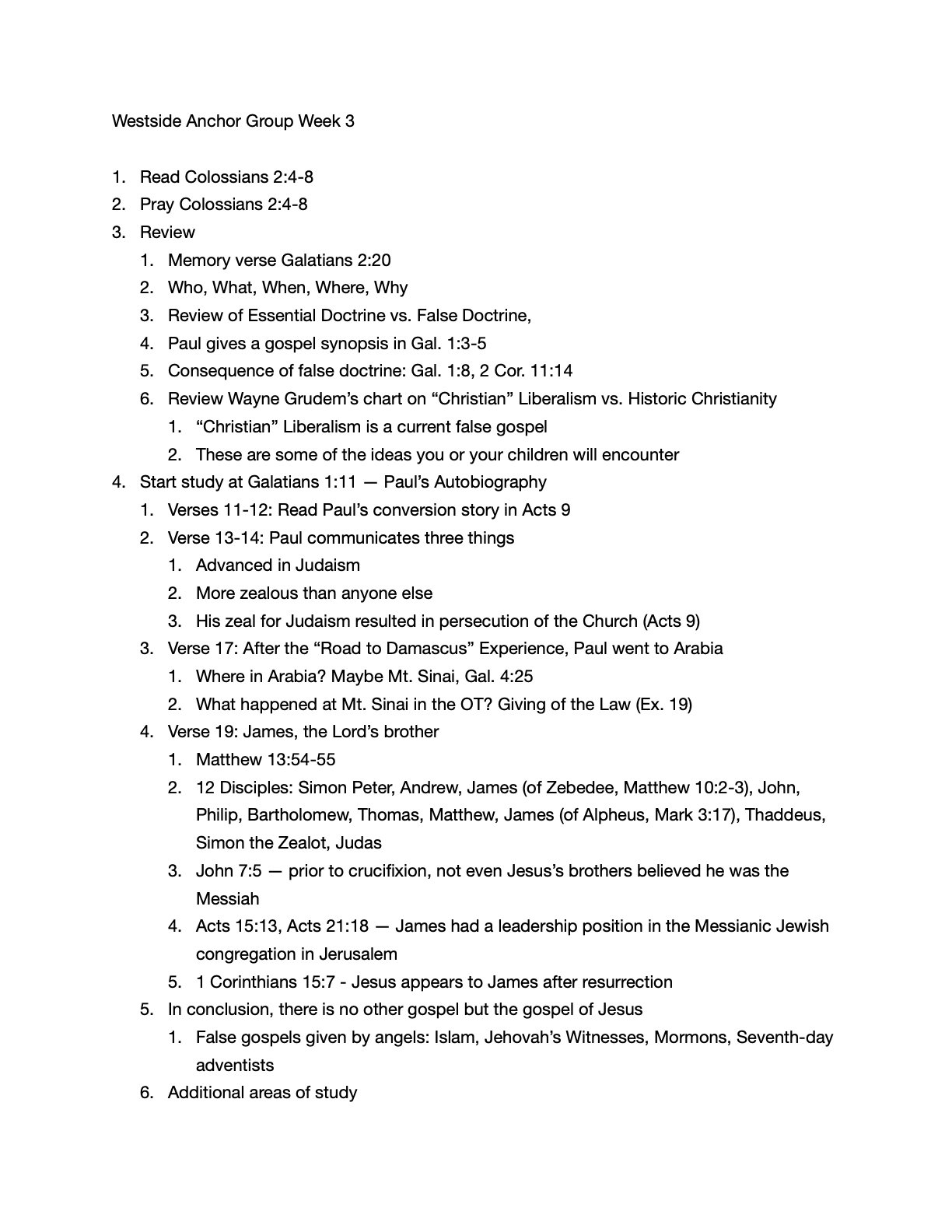PART 3 —
If you’re new to this series, please see part 1 and part 2 for an overview of some Bible study techniques.
Today’s study resumed with Galatians 1:11— essentially the beginning of Paul’s autobiography. The notes from the cross-referenced footnotes (cf) from www.blueletterbible.org suggest reading from Acts 9. When we read Acts 9, we get more details to the events Paul referenced in his letter, which was his persecution of Christians.
After his greeting, gospel summary, and renouncement of a false gospel in the first part of the chapter, Paul moves into his credentials. Picking up in verse 11, he says “I, Paul, want you, the church, my brothers and sisters, to know that the gospel I preach I received by revelation from Jesus Christ.”
In essence, he begins his resume with saying: everything I teach I was taught by God.
Next he explains how he used to be: advancing in Judaism, zealous for traditions, a persecutor of Christians. We have even more context for his former way of life when we read Acts 9— there we have not only how he used to be but how Jesus revealed Himself to Paul on Paul’s way to Damascus.
Then Paul says, “BUT, God set me apart to preach the good news of Jesus to the Gentiles.”
Let’s pause here.
It was God’s plan for the Gentiles to be a part of His chosen people— even in the Old Testament. When we think of the God’s Chosen People in the Old Testament, we think of the Israelites, and rightly so. God chose Abraham and his lineage to be His special, set apart people. But even then, there was a path to God for the pagans. (You can read more about that here).
Now Paul is saying, I was set-apart to share the Good News about Jesus with the Gentiles. It has been God’s will for me from birth. After identifying his calling and mission, he begins to outline his ministry:
He was converted on the road to Damascus (Galatians 1:15-16, Acts 9)
He immediately left for Arabia (maybe Mount Sinai, Gal. 4:25) without consulting anyone
Then after three years went to Jerusalem to meet with Peter and James, the Lord’s brother. He stayed there for 15 days.
Then he went to Syria and Cilicia without visiting any Messianic Jewish communities / churches in Judea
When we read Galatians 1 online at www.blueletterbible.org, we see that the include cross references. So if your Bible doesn’t have many, consider checking your passage online and seeing if anything else comes up.
One of the areas of potential study we identified last time was the study of James, the half-brother of the LORD.
Using Blue Letter Bible, we were able to search for the verse (Galatians 1:19) and click on the word James in order to see every instance the word James is used in the Bible. We knew we wanted to focus on the gospels so that’s where we limited our search results. In doing so, we were able to quickly identify the two Jameses of the 12 Disciples: James, the son of Zebedee and James, the son of Alpheus. This meant that James, Jesus’s half-brother, was not one of the 12 Disciples.
Which prompted the question: Did James believe Jesus was the Messiah before Jesus ascended into Heaven? None of the search results for the name “James” answered this question. But when we searched for the word “brothers,” we found John 7:5, which seems to indicate that James and Jesus’s other half brothers (Joseph, Simon and Judas, Matt. 13:54-55) did not believe Jesus was the Messiah during his ministry. Scripture does state, however, that Jesus appeared to James after his resurrection (1 Corinthians 15:7) and that James went on to be a “pillar” in the Messianic Jewish community in Jerusalem (Acts 15:13, Acts 21:18).
It might seem silly to spend so much time thinking about James, the half-brother of Jesus, yet Paul determined he was important enough to be specifically named in his letter to the churches. We must also remember that our goal with studying the Bible isn’t necessarily application; it is a better understanding of who God is, how he works, etc. There is no behavioral change associated with learning about James but we do get a glimpse into a life changed by Jesus and how that life went on to influence the greatest evangelist of all time!
Other areas of study would be:
The phrase “brothers and sisters.” A search in Blue Letter Bible of the word “brother” and then the word “sister” would begin to demonstrate how, when and where this phrase is used. This study would could help develop an understanding of how God views the church.
God’s call on Paul’s life to the Gentiles. Why did God want Paul to preach among the Gentiles? Through scripture we see that it was always God’s plan for all people to be saved (great evidence for this in the OT). These are great verses to get your study started: Acts 10:34-43, Acts 15:12-21, Romans 15:7-13, Ephesians 3:1-13, and 1 Kings 8:41-43. A great word search to further your study is the word “foreigner” since the foreigner is an Old Testament equivalent to a person outside of God’s chosen people (aka, Israelites). (I did this and wrote my findings here)
In Acts 9:4-8, Jesus asks, “Why are you persecuting me?” Here Jesus identifies himself with believers. Where else does Jesus identify himself with believers? A good first-step would be Matthew 25:40. Another question is: does Jesus ever identify himself with non-believers?







